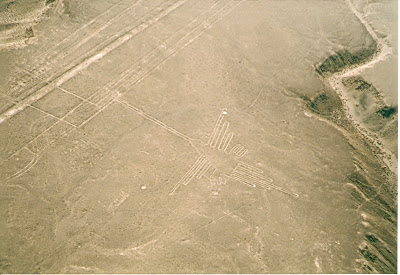The Nazca Lines are a series of ancient geoglyphs
located in the Nazca Desert in southern Peru. They were designated as a
UNESCO World Heritage Site in 1994. The high, arid plateau stretches
more than 80 kilometres (50 mi) between the towns of Nazca and Palpa on
the Pampas de Jumana about 400 km south of the capital Lima. The
'lines' were created by the Nazca Indians between 400 and 650 AD and
include hundreds of individual figures ranging in complexity from simple
lines to stylized creatures. They are shallow designs made in the ground by removing the
reddish pebbles and uncovering the whitish/grayish ground beneath, with the largest figures being over 200 metres (660 ft) across. Scholars
differ in interpreting the purpose of the designs, but in general they
ascribe religious significance to them. Other theories have been
summarized as follows:- "the geometric ones could indicate the flow of water or be connected
to rituals to summon water. The spiders, birds, and plants could be
fertility symbols. Other possible explanations include irrigation
schemes or giant astronomical calendars."
Mike
Hughes and I boarding the light aircraft for the 45 minutes flight.
Some of these designs may take a little deciphering, I will try to give
guidance.
KILLER WHALE - almost dead centre, the open mouth is pointing upwards.
GEOMETRIC SHAPESRHOMBOIDS
THE ASTRONAUT - on the slope of the lower left mount,
closer view of the most enigmatic of all the 'lines'.
DOG - left and above centre.
CONDOR - right.
CONDOR - closer view centre, bill downwards.
HUMMINGBIRD
SPIDER - almost centre.
SPIDER - left.
ALBATROSS - centre.
PARROT - head dead centre with open bill.
REPTILE & PARROT - centre.
HANDS left & TREE right.
TREE
centre and WATCHTOWER top right corner. We did give the 'tower' a go,
but you need a whole lot more elevation than that to make any sense of
'the lines'.
MONKEY - with 'endless' tail.
Due to the dry, windless, and stable climate of the plateau
and its isolation, for the most part the lines have been preserved.
Extremely rare changes in weather may temporarily alter the general
designs, while in more recent years the lines have been deteriorating due to an
influx of squatters inhabiting the lands.





















No comments:
Post a Comment